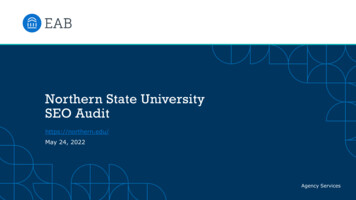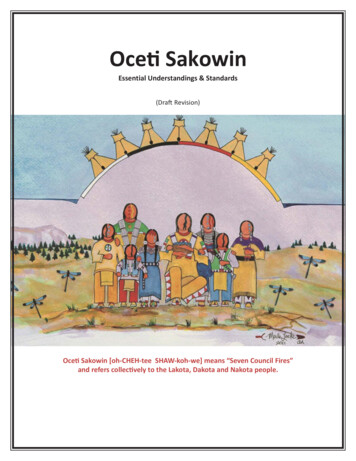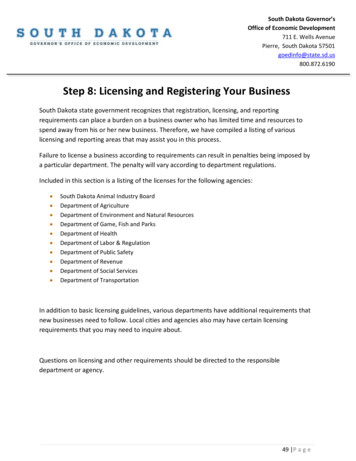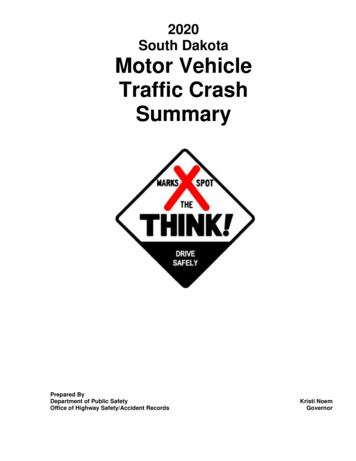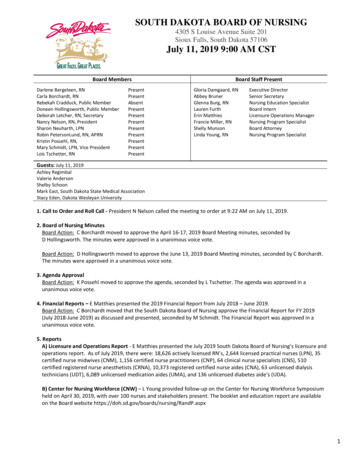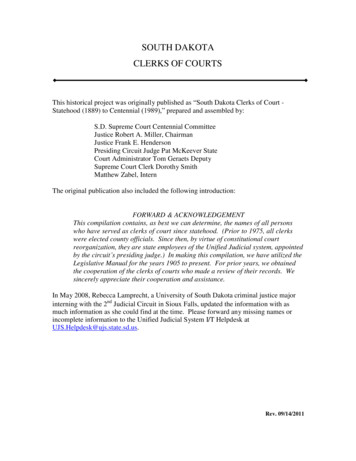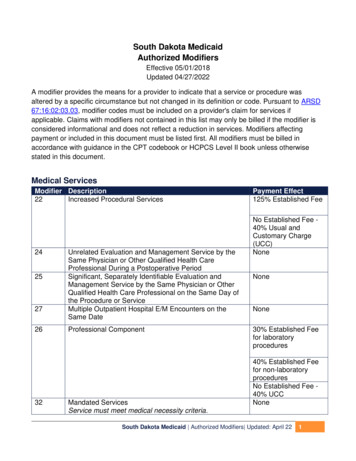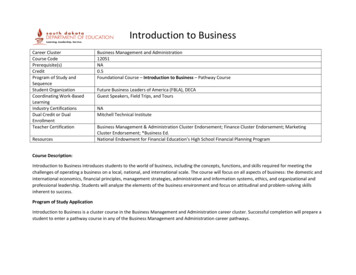
Transcription
Introduction to BusinessCareer ClusterCourse CodePrerequisite(s)CreditProgram of Study andSequenceStudent OrganizationCoordinating Work-BasedLearningIndustry CertificationsDual Credit or DualEnrollmentTeacher CertificationResourcesBusiness Management and Administration12051NA0.5Foundational Course – Introduction to Business – Pathway CourseFuture Business Leaders of America (FBLA), DECAGuest Speakers, Field Trips, and ToursNAMitchell Technical InstituteBusiness Management & Administration Cluster Endorsement; Finance Cluster Endorsement; MarketingCluster Endorsement; *Business Ed.National Endowment for Financial Education’s High School Financial Planning ProgramCourse Description:Introduction to Business introduces students to the world of business, including the concepts, functions, and skills required for meeting thechallenges of operating a business on a local, national, and international scale. The course will focus on all aspects of business: the domestic andinternational economics, financial principles, management strategies, administrative and information systems, ethics, and organizational andprofessional leadership. Students will analyze the elements of the business environment and focus on attitudinal and problem-solving skillsinherent to success.Program of Study ApplicationIntroduction to Business is a cluster course in the Business Management and Administration career cluster. Successful completion will prepare astudent to enter a pathway course in any of the Business Management and Administration career pathways.
Career Cluster: Business Management & AdministrationCourse: Introduction to BusinessCourse StandardsIB 1 Students will identify skills needed to be successful in the global economic environment.Webb LevelLevel 1:Recall andReproductionLevel 1:Recall andReproductionLevel 1:Recall andReproductionNotesSub-indicatorIB 1.1 Explain the terms economics and economic activityExamples: Explain how limited resources affect business Explain factors which affect supply and demand Explain concepts of economic resources Identify economic indicators to detect economic trends andconditions Discuss career choices in economicsIB 1.2 Explain businesses’ roles in societyExamples: Explain ways in which businesses interact with society Describe different ways our government intervenes in and/orregulates business Explain the nature of labor unionsIB 1.3 Describe the different types of economic systemsExamples: Explain the nature of global trade Compare and contrast the different types of economic systems Explain how economic systems answer the basic economicquestionsIntegrated Content
Career Cluster: Business Management & AdministrationCourse: Introduction to BusinessIB 2 Students will compare the different forms of business organizations and management styles.Webb LevelLevel 2:Skill/ConceptLevel 3:StrategicThinkingNotesSub-indicatorIB 2.1 Compare and contrast different forms of business organizationsExamples: Discuss common forms of business ownership Explain factors that affect the selection of ownership Explore careers concerning business ownershipIB 2.2 Differentiate among different management styles and human resourceproceduresExamples: Examine management strategies to improve performance andcompetitive advantages of an organization Determine human resources management legal responsibility inmaintaining labor relations Determine proper human resources procedures for managingemployees Examine career options within business organizationsIntegrated Content
Career Cluster: Business Management & AdministrationCourse: Introduction to BusinessIB 3 Students will apply concepts of marketing, business finances and technology in the operation of a business.Webb LevelLevel 2:Skill/ConceptLevel 1:Recall andReproductionLevel 2:Skill/ConceptNotesSub-indicatorIB 3.1 Demonstrate marketing principles involved in business operationsExamples: Describe factors that influence customer-business relationships Identify the elements of the marketing mix Explain the effects of competition in a free enterprise system Explore careers in marketing and sales fieldsIB 3.2 Describe roles technology plays in business operationsExamples: Identify information technologies commonly used in businessoperations Discuss how information technology impacts business operations Discuss technology careers available within business organizationsIB 3.3 Explain the financial process needed to start and operate a businessExamples: Recognize the need for a business plan Importance of maintaining accurate business records using theAcceptable Accounting Process Importance of utilizing information available to make sounddecisions in operating a business Explain the importance of the profit motiveIntegrated Content
Career Cluster: Business Management & AdministrationCourse: Introduction to BusinessIB 4: Students will evaluate roles individuals play as consumers in the economy and financial management tools needed to be a successfulconsumer.Webb LevelLevel 3:StrategicThinkingLevel 3:StrategicThinkingLevel 2:Skill/ConceptLevel 2:Skill/ConceptNotesSub-indicatorIB 4.1 Demonstrate how important a consumer is in the global economyExamples: Apply the steps in a rational decision-making process to a situationinvolving an economic decision by an individual Demonstrate responsibility for consequences of economic choicesIB 4.2 Apply processes involved in consumer financial planningExamples: Identify the difference between needs and wants Describe the importance of financial goals Create and analyze the budget process Examine careers in financial planningIB 4.3 Examine available banking services and credit optionsExamples: Describe different types of financial institutions and their services Explain various types of consumer credit Describe positive and negative consequences of using credit Explore careers pertaining to financial servicesIB 4.4 Explain savings and investment options to meet short and long termgoalsExamples: Explain the time value of money Explain differences between savings and investing Identify criteria for choosing savings and investment options Examine careers concerning savings and investingIntegrated ContentConsumer Credit caninclude: credit cards,installment loans,student loans, andmortgages
Career Cluster: Business Management & Administration Course: Introduction to Business IB 3 Students will apply concepts of marketing, business finances and technology in the operation of a business. Webb Level Sub-indicator Integrated Content Level 2: Skill/Concept IB 3.1 Demonstrate marketing principles involved in business operations Examples:
